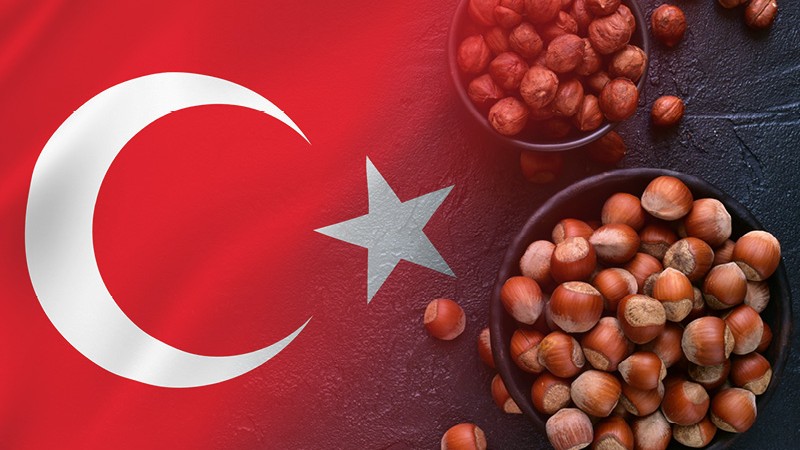Hazelnuts: “Concerns over climate change are higher than ever”
January 3, 2024 at 1:00 PM ,
Der AUDITOR

Which were the main difficulties faced by the Turkish hazelnut market in 2023? What has changed compared to the last two years?
When evaluating the hazelnut market in 2023, we got to handle pre-season and post-season separately, but the main difficulty that is valid for both terms is the economic crisis going on in Turkiye. The hardships of dramatic changes in currency rates (and currency rates not increasing as much as the costs, so our prices being much higher than competition), Central Bank's unorthodox decisions, new laws to regulate the export payments, bank loans’ interest rate reaching and exceeding loan shark levels, inflation reaching 200% levels or more, costs of labour and production shooting through the roof etc. dominated 2023 - I believe this is what's changed compared to the last two years.
As for demand, the competition from the USA, Georgia and Azerbaijan is very much a threat and their lucrative prices are becoming much of a headache lately. Although demand is there, we are the last ones to get a taste of it due to other origins being USD 0.50-1.00/kg cheaper than ours. We feel their presence and competition more and more each year - especially the USA origin hazelnuts now have more acceptance in the market compared to the last two years.
Between Jan 2023 - Aug 2023, the market was somewhat stable, as far as I can recall, especially after the crop size estimation of 810,000 mt declared by the INC; we were all happy. It was all fun and games until crop size estimations turned out to be way off target. The first eight months of 2023 were to struggle with the economy and once the season started, the struggles of lack of quality and quantity arose which is believed to be caused by the brown marmorated stink bug. We did not have this phenomenon in the last two years, so this is a new struggle for us.
We still do not know what the actual crop size is and that brings us to our next difficulty: speculations and manipulation of the market. The ones that hold huge stocks or purchased in-shell hazelnuts around TRY 100/kg claim that the crop size is 400.000 mt, the ones that made huge sales before the season around EUR 5.00/kg claim it's still around 700.000 mt.
What impact do the wars in Ukraine and Israel have on the market? Are the political tensions in various African countries also a cause for concern here?
As we do not have a market in Ukraine or Israel, I am not really sure about the consequences of these events but we cannot deny the fact that consumption of hazelnuts decreased in those regions. For example, the info from the Black Sea Exporters' Union clearly shows that in 2021, Ukraine imported 4.186.533 mt of hazelnuts from Turkiye but in 2022, it was 2.987.618 mt, so a total of 1.2 million mt of exports were lost within a year.
I am not sure how all these will play out for hazelnuts, but am sure of one thing - wherever a war or problem arises, Turkiye somehow manages to suffer from it - either economically or by accepting all refugees from that region.
In 2023, climate change and its impact on global commodity production was felt like never before. What should growers and market players be prepared for in the coming years?
Climate change still poses a huge threat in agriculture as climate regimes changed dramatically in our region. I am writing this in November and the weather is still quite nice which is not ideal for hazelnut trees. We had 27-28°C temperatures here this weekend, which is absolutely crazy! As you know, each year we worry that it is not cold enough in winter which makes hazelnuts susceptible to frost damage each March-April. The upcoming year marks the decade anniversary of the last frost that happened in 2014 (the previous one was in 2004), so concerns over climate change and its effects are much higher this year than ever.
I believe the only thing that can be done is an agricultural fight which includes engineering of cold resistant seeds and renewal of old trees in the region. Be that as it may, there seems to be no consequences on the crop size as Turkiye had three big crops in three consecutive years, which is also unusual.
Commodity prices have risen significantly in many markets for another year in a row. Inflation and higher production costs are leaving their mark; the hazelnut market is no exception here. Do you think consumers will look for cheaper alternatives in the long run?
They already are looking for cheaper alternatives; either as cheaper origins such as the American, Georgian or Azerbaijanian hazelnuts or simply replace hazelnuts with almonds, peanuts, walnuts etc. as the prices of these commodities soared recently. My clients in Asia reduced their hazelnut exports significantly after the prices went over USD 7.00/kg levels and went on with almonds.
Looking at the current market situation, what challenges might the hazelnut market face in the 2024/2025 season?
Well, I do not see a challenge for the global hazelnut market as global production still exceeds total consumption. As for Turkiye, the things I've listed in question one are the major challenges for the hazelnut market and they're expected to deepen even further. The shifts in weather and increased susceptibility to frost is very much a threat, especially this year. Also, if we don't succeed at the battle against the brown stink bug, it'll be one of the major challenges for the next season.





